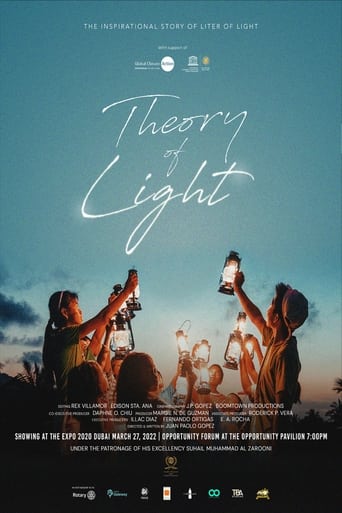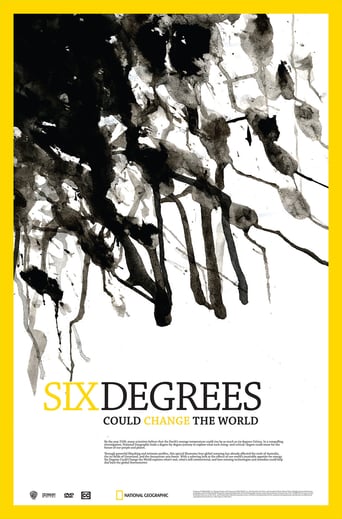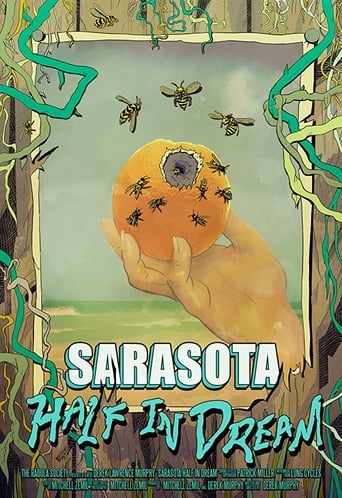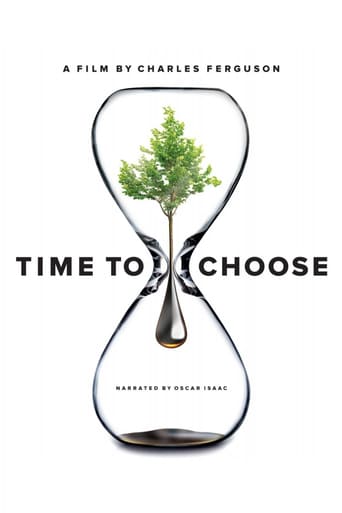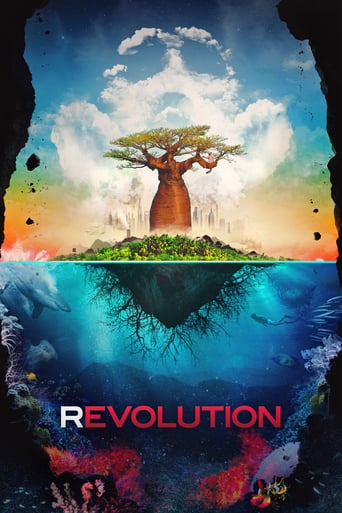
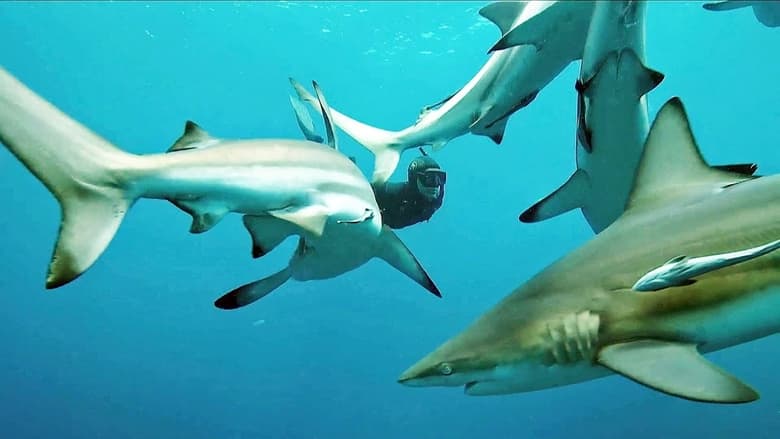
Revolution (2012)
Revolution is a new movie from internationally-acclaimed filmmaker Rob Stewart. A follow-up to his award-winning documentary Sharkwater, this continues his remarkable journey of discovery to find out that what he thought was a shark problem is actually a people problem. As Stewart's battle to save sharks escalates, he uncovers grave dangers threatening not just sharks, but humanity. In an effort to uncover the truth and find the secret to saving our own species, Stewart embarks on a life-threatening adventure through 15 countries, over four years in the making. In the past four years the backdrop of ocean issues has changed completely. Saving sharks will be a pointless endeavor if we are losing everything else in the ocean, not just sharks. Burning fossil fuels is releasing carbon dioxide into the atmosphere; changing the oceans, changing atmospheric chemistry and altering our climate.
Watch Trailer
Cast
Similar titles
Reviews
Overrated
The performances transcend the film's tropes, grounding it in characters that feel more complete than this subgenre often produces.
The movie's neither hopeful in contrived ways, nor hopeless in different contrived ways. Somehow it manages to be wonderful
It's the kind of movie you'll want to see a second time with someone who hasn't seen it yet, to remember what it was like to watch it for the first time.
Greetings again from the darkness. If you have seen Sharktown (2007), then you are already sold on the earnest commitment to conservation of documentarian Rob Stewart. In his earlier effort, the focus was on saving the shark population. This time out, he is imploring the human race "save ourselves".Rather than blindly preach the evils of global warming and pollution, Mr. Stewart travels to 15 countries over 4 years putting together case studies of overall effects. It is a bit odd to see the first few minutes of this film focus on sharks and Stewart's first movie. It feels as if he is trying to convince us of his worthiness, rather than letting his research speak for itself. Despite this minor complaint, the underwater photography alone makes this film worth watching. Stewart's remarkable eye combined with top notch equipment and real knowledge of ocean life, elevate his photograph work to the highest level.Of particular interest are Stewart's segments on Coral Eden in New Guinea, the diminishing coral reefs worldwide, the excessive carbon dioxide being absorbed by oceans due to the preponderance of Coal usage for energy (China opens a new coal plant each week), deforestation and its effect on Lemurs in Madagascar, the Canadian Tar Sands (Stewart is from Canada), and the increased banning of Shark Finning (now banned in more than 100 countries). Stewart drives home the point that most of the issues arise from the deep connection between governments and corporations.Stewart's mission is to convince individuals – especially young people – that they can make a difference; and in fact they MUST make a difference, or things will be much different and worse within their lifetimes. If we believe corporations will make changes for the sake of humanity and the saving of species, then we are dead wrong.
Totally Moved By this Film - Actually if you live on this earth you should see this movie! We are literally consuming the planet and all the resources on the planet that create life - it is time to reassess our wants and needs so we stop destroying the future for generations to come. This stunning motion picture will open you eyes to the fact we need to change and we need to start by educating everyone around us. They need to be aware of their actions, they need to decide to do something to sustain the planet not destroy it. Fight for something you love or believe in- don't sit by and watch your kids future be consumed. Get involved. Tell your friends to go see this movie - it will change their lives, it has already changed mine !!!
Before the film began, the audience was told that Rob Stewart was on his way over to do a post-screening Q&A with us. The film screened: Revolution. Expertly photographed, with Rob Stewart himself at the helm of the cinematography. This is an important documentary that gives unfiltered voice and expedient agency to the voice of youth all around the world. Felix Finkbeiner and a young Lebanese woman (I'm unable to remember her name) were two among many who brought me to such wellsprings of emotion as I have never felt. The grandchildren of the world are fighting for the survival of their grandchildren. As Rob Stewart told me in my February interview with him: "In the past the people affected by a destructive culture were the ones who moved to resolve it, for slavery it was the blacks, for women's suffrage it was women. Now, youth are facing the greatest social challenge. Youth have not drunk the Kool-Aid so to speak, they don't rationalize they just do what needs to be done. We are eating their future."The striking beauty of the cinematography featured in this film is a testament to the way in which Rob Stewart and many others featured in this film might view the ocean: with such vivid and lucid beauty. The ocean is the lifeblood of all life on Earth.Revolution brings into a very clear focus, as clear as possible, the incredible efficacy of the multi-tiered project of global awareness, whether from the leading environmental scientists, or public demonstrations, everyone has an integral role to play in the fight for human survival on this gorgeous planet. We can change, because we are changing. The question is not whether or not we should change, the question is, what direction to we want to go in?Canada, and more specifically Alberta, is home to the most destructive industrial resource project on Earth, the Tar Sands. It is no wonder Rob Stewart chose Alberta as a focus-group to preview his film, as Alberta is exactly where the change in direction needs to occur. As the "godfather" of coral and former chief scientist at the Australian Institute of Marine Science, Charlie Veron, said in the film: the only way to that we can avoid increased ocean acidification, which is the cause of most major extinctions in the history of life on planet Earth, is to stop burning fossil fuels. Canada, home to Greenpeace and other environmentally-savvy networks, has been the recipient of the Fossil Award, given to the nation which has most hindered global efforts to reduce carbon emissions, 5 years in a row.Through an insightful look at sharks, flamboyant cuttlefish, and the Canadian lynx, Rob Stewart takes us on a narrative journey into the depths and heights of evolutionary progress, and how the will to live is our greatest asset as inheritors of the great and mysterious onus called life in this universe. We must realize that our responsibility as living beings is to reciprocate, or we will get exactly what is coming, without exception, regardless of our being a singular species of unrivaled capacity, we are not invincible to extinction.Soon there will be 7 billion people on Earth, yet non-renewable resources are consumed exponentially. Canada has no energy policy. During a conversation before the screening with George Melnyk, professor of literature, film and Western Canadian identity at University of Calgary, he said: "I'm in my sixties, and I've spent most of my life in Canada under Liberal federal governments. Since 2006, under the minority Harper government and now the majority Harper government, so we're talking like seven years, we have moved much more clearly towards a partisan position, meaning that we support a group of nations, a group of people that want to act a certain way in the world, we don't want to stand away from that a little bit, right? So that balance being partisan and trying to be non-partisan, that has now disappeared. We're very military-oriented. The experience in Afghanistan has been completely wasted."An increasing number of people bear the brunt of starvation, while trillions are spent to wage what is fast becoming the longest war in modern history (Afghanistan) and bail out indebted banks. "The scientists have done their job, now it's time for the politicians to do theirs," says an interviewee in Revolution.At the end of the film, Rob Stewart told us about the many awards the film has already received, he was glowing with optimism. Revolution is due to appear on more screens than any other documentary in Canadian history. One hand raised came down to a more pessimistic tune. To that, Stewart simply responded that it is usually the people who are not doing anything who are pessimistic, the people who are actually involved in helping to make positive change are optimistic.For the last question, my hand went up like lightning. He took my question; what I had been waiting to ask for months since our private phone conversation would see the light of day in front of a full crowd at the university theater: "What is the biggest thing that makes you optimistic every day?" I asked. I remembered the way I felt after I first spoke to Stewart; crushing powerlessness. He responded something to the tune of: What makes me optimistic everyday is observing life itself, and how life has survived. I think that especially now when we are bombarded by over-consumptive habits in the use of technology, finding meaning in helping to save ourselves and the Earth is the greatest source of fulfillment that we need right now.Revolution opens in theaters everywhere April 12. See my full film review/reflection story on Media Co-op
An incredible film by an incredible man.Gorgeous underwater photography - phytoplankton at night, schools of fish moving in fantastic patterns, lemurs in Madagascar dancing and sunbathing!! The interviews with scientists, conservationists and activists present wholistic views on the issues - which left me feeling educated, optimistic and inspired.The film takes you through a visual history of underwater and terrestrial life in order to better see where we are and what needs to happen.Essential viewing for all.

